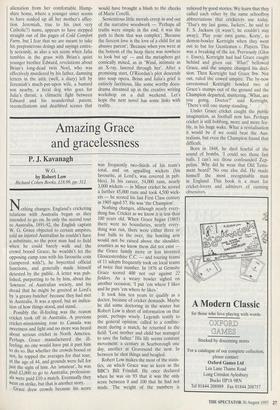Something nasty in the peat-shed
William Scammell
THE BOY IN THE MOON by Kate O'Riordan Flamingo, £12.99, pp.
Kate O'Riordan's second novel opens with the rather too symbolic sight of four- year-old Sam gazing up at the moon and finding a distressed boy there instead of the legendary man. 'Look, it's a boy, and he's screaming'. This, and a later scene in which he gets lost in an airport, prefigure tragedy. His Irish father Brian, casual to the point of idiocy, lets him walk the parapet of a high bridge, from which he falls to his death. Julia, Brian's middle-class English wife, already a worrier and control-freak, regards him as little better than a murder- er, and rushes out of his life to a remote part of Ireland to try and numb herself into submission to fate.
Early on, in the paciest and most read- able episode, The Boy in the Moon shows signs of wanting to be a comic account of a modern marriage:
I'm coming, Brian gasped.
She thought: Don't let me stop you, dear. He thought: I don't know why I don't just go down to the local abattoir and shag a dead sheep.
He blinked. She twitched. He yawned. She sneezed. He came. She didn't.
They curled up. She reached for a wad of tis- sues.
He thought: I could divorce her for less.
She thought: The sheets need changing any- way.
They thought: Not so bad. Must do that again some time soon.
This throwaway humour soon switches, however, into compassionate mode. Brian falls apart after the horrendous accident. Julia first tries to find consolation in abstruse scientific theories, imagining
some inexplicable dimension . . . when, in a reversal of time, Sam would swoop upwards to land on a stone bridge and fall into her outstretched, open arms.
She then billets herself on Jeremiah, Brian's widower father, 'the least comfort- ing of men', in the far west of Ireland, where he scrapes a harsh living from the stony soil.
Flashbacks fill in the gothic horrors of Brian's childhood, hinting at unspeakable goings-on in the peat-shed, and Julia's alienation from her comfortable Hamp- shire home, where a younger sister seems to have soaked up all her mother's affec- tion. Jeremiah, true to his (not very Catholic?) name, appears to have stepped straight out of the pages of Cold Comfort Fann, but I fear that we are meant to take his preposterous doings and sayings entire- ly seriously, as also a sex scene when Julia tumbles in the grass with Brian's quiet younger brother Edward, revelations about Brian's long-dead twin Noel, who was effectively murdered by his father, damning letters in the attic (well, a diary) left by Jeremiah's much-put-upon wife, a bastard son nearby, a feral dog who goes for Julia's throat, a climactic fight between Edward and his neanderthal parent, reconciliations and deathbed scenes that would have brought a blush to the cheeks of Marie Corelli.
Sententious little morals creep in and out of the narrative woodwork — 'Perhaps all truths were simple in the end; it was the path to them that was complex'; 'Because the fiercest love is the love of a child for an abusive parent'; 'Because when you were at the bottom of the heap there was nowhere to look but up' — and the metaphors get comically mixed, as in 'Wind, intimate as an X-ray, lasered through her'. After a promising start, O'Riordan's plot descends into soap opera. Brian and Julia's grief is entirely factitious, like some worthy docu- drama dreamed up in the creative writing workshop on a dull weekend. Let's hope the next novel has some links with reality.



















































 Previous page
Previous page